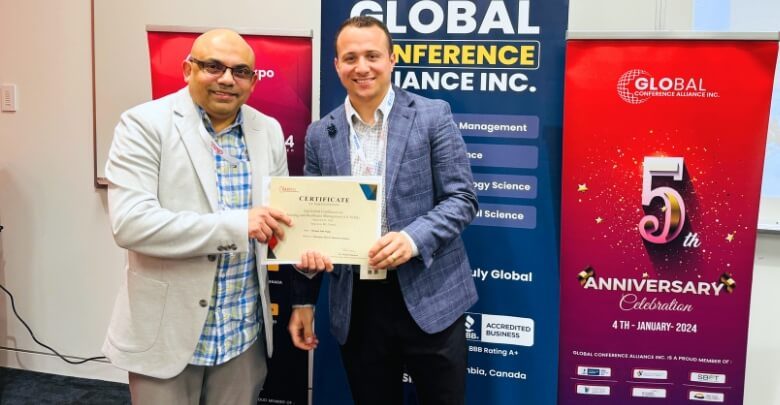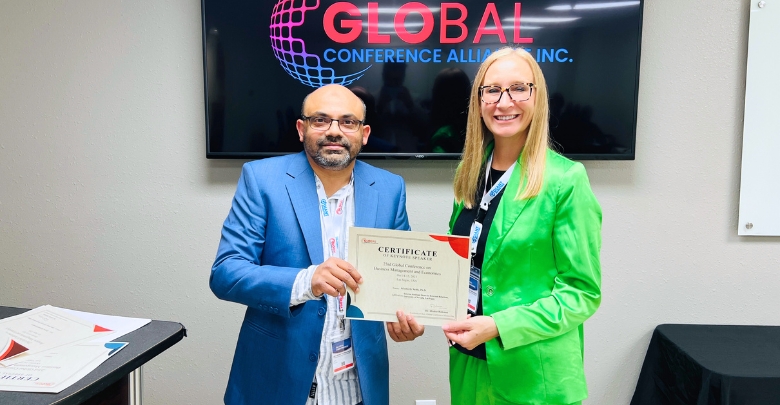Conference certification is a way for professionals to showcase their knowledge and expertise in a specific field or industry. It is a credential earned by individuals who have completed a program or course of study designed to enhance their skills and abilities.
The purpose of conference certification is to provide professionals with a competitive advantage in the job market and demonstrate their commitment to ongoing education and professional development.
Various conference certification programs are available, each personalized to specific industries or areas of expertise. These programs typically require individuals to complete a certain number of hours of training, pass an exam, or demonstrate proficiency in a particular skill or area of knowledge.
Conference certification can be obtained through professional organizations, trade associations, or educational institutions and can be a valuable asset for individuals seeking career advancement.
In this article, we will explore the types of conference certification programs available, the benefits of obtaining conference certification, and how to maximize the value of this credential.
Key Takeaways:
- Conference certification showcases knowledge and expertise in a specific field or industry and is earned by completing a program or course of study.
- Attendees and speakers must meet certain requirements, such as completing sessions, passing exams, or demonstrating proficiency in a particular skill or area of knowledge.
- Conference certification provides professionals with a competitive advantage in the job market, demonstrates commitment to ongoing education and professional development, and can be a valuable tool for career advancement.
- Updating resumes and LinkedIn profiles to showcase conference certification can lead to new opportunities for career advancement or business growth and help establish individuals as thought leaders in their field.
Definition and Purpose of Conference Certification
The definition and purpose of conference certification pertain to establishing a standardized system of recognizing and validating the knowledge and skills of professionals in a particular field through completing a comprehensive conference of educational and training activities.
Conference certification programs serve as a means for professionals to demonstrate their expertise and commitment to their respective fields. For employers, conference certification can be a valuable tool for assessing job candidates’ qualifications or determining current employees’ eligibility for promotions or other opportunities.
However, conference certification programs also have drawbacks, including the cost of participation and the potential for bias in the certification process.
The role of technology in conference certification processes has become increasingly important in recent years. Online platforms and digital tools have made it easier and more convenient for professionals to participate in certification programs while allowing for greater efficiency and accuracy in the certification process.
The use of technology also raises issues related to data security and privacy, as well as concerns about the integrity of online testing and evaluation. These factors must be carefully considered as conference certification programs continue to evolve and adapt to meet the changing needs of professionals and employers alike.
Moving on to the types of conference certification programs, organizations can take several approaches to create and implement effective certification programs.
Types of Conference Certification Programs
The types of conference certification programs can be categorized based on the certifications offered to attendees and speakers.
Attendee certification requirements may include completing several sessions, passing an exam, or meeting certain criteria related to their profession or industry.

Speaker certification requirements may include demonstrating expertise or experience in a particular topic, submitting proposals or abstracts for review, or completing training or professional development programs.
These certification programs ensure that conference attendees receive high-quality education and that speakers are qualified and knowledgeable in their areas of expertise.
Attendee Certification Requirements
To fulfill the requirements for attendee certification at a conference, individuals must typically complete specified sessions or courses and demonstrate their comprehension through assessments or evaluations. The importance of verification cannot be overstated, as it ensures that attendees have met the requirements to receive certification.
Common attendee mistakes include not attending all the required sessions or not demonstrating comprehension during assessments. It is important for attendees to carefully review the requirements before attending the conference and plan their schedules accordingly to ensure they meet all requirements.
Speaker certification requirements also play a vital role in the conference certification process. To become a certified speaker, individuals must meet certain qualifications and demonstrate their expertise in their field through their presentation at the conference.
By meeting these requirements, speakers can help ensure attendees receive the highest quality education and training possible.
Speaker Certification Requirements
Meeting specific qualifications and demonstrating expertise in a given field are key requirements for individuals seeking certification as speakers at professional events. Speaker evaluation is a rigorous process that involves assessing a candidate’s knowledge of the subject, presentation skills, and ability to engage an audience.
Before being accredited as a conference speaker, candidates may need to submit a detailed application that outlines their experience, credentials, and accomplishments in the field. They may also need to provide references from other industry experts who can attest to their speaking abilities.
In addition to meeting these qualifications, candidates may need to undergo a training program to enhance their speaking skills further. This may involve attending workshops, seminars, or coaching sessions on public speaking, presentation design, and audience engagement.
Once accredited, speakers must maintain their certification by participating in ongoing professional development activities and continuing to excel in their field. The benefits of conference certification for speakers will be discussed in the subsequent section.
Benefits of Conference Certification
Surprisingly, obtaining conference certification offers many advantages, including increased industry recognition and marketability for professionals. Conference certification is an excellent way to demonstrate your proficiency and commitment to your expertise.
By obtaining certification, you can prove to your employers and clients that you have the skills and knowledge necessary to excel in your profession. This recognition can lead to career advancement and increased opportunities for professional development.
Additionally, conference certification provides a benchmark for professional excellence. It allows professionals to stay up-to-date with industry trends and best practices, ensuring they remain competitive and relevant. This benefits the individual and the industry by promoting a higher standard of quality.
Overall, conference certification is a valuable investment for professionals looking to grow careers and achieve greater success. To learn more about how to obtain conference certification, read on to the next section.
How to Obtain Conference Certification?
Acquiring industry recognition and enhancing marketability can be accomplished by obtaining certification for attending professional conferences. Conference certification benefits individuals by providing them with concrete evidence of their commitment to professional development.
The certification is proof of attendance at a conference and completion of its requirements. This demonstrates to employers and clients that the individual is up-to-date with the latest industry trends and comprehensively understands the subject.
To obtain conference certification, individuals must typically attend a conference and complete specific requirements. These requirements may include attending specific sessions, taking notes, and passing a test. The importance of conference certification training lies in its ability to provide individuals with a competitive edge in the job market.
It can also lead to greater earning potential and recognition within the industry. By obtaining certification, individuals can establish themselves as experts in their field, leading to increased career advancement opportunities.
To maximize the value of conference certification, individuals should take advantage of the resources the certifying body provides. This may include attending additional training sessions, networking with other professionals, and staying up-to-date with industry news and trends. By doing so, individuals can continue to build upon their knowledge and expertise, leading to further career success opportunities.
Tips for Maximizing the Value of Conference Certification
- To maximize the value of conference certification, attendees should focus on three key areas: networking, skills application, and professional branding.
- Networking with peers allows building relationships with like-minded professionals, exchanging ideas, and gaining insights.
- Applying newly acquired skills and knowledge to real-world situations can lead to career advancement and personal growth.
- Updating one’s resume and LinkedIn profile with conference certification can enhance professional credibility and attract potential employers.
- By prioritizing these three areas, conference attendees can ensure they get the most out of their certification and set themselves up for career success.
Networking with Peers
Connecting with colleagues in your field at a conference can provide valuable opportunities for networking and exchanging ideas. These collaborative opportunities can help expand your professional network and provide insights into industry trends and practices.
By attending workshops and sessions, you can better understand your field’s challenges and opportunities and connect with like-minded professionals who can offer new perspectives on your work.
Networking with peers can also lead to new career opportunities, as you may learn about job openings or meet potential employers. It can also help you establish yourself as a thought leader by sharing your insights and experiences.
By actively engaging with your peers and building relationships, you can create a strong network of professional contacts that can benefit your career for years.
In the subsequent section about applying new skills and knowledge, we will explore how attending conferences can also help you acquire new skills and knowledge to improve your work performance.
Applying New Skills and Knowledge
By implementing the new skills and knowledge gained from attending professional development events, individuals can enhance their performance and contribute to the growth of their organization.
These events provide opportunities for attendees to learn about industry trends, best practices, and new technologies that can improve their work. Moreover, attendees can gain practical applications of this knowledge by participating in interactive workshops and case studies that simulate real-life scenarios.
To maximize personal growth, attendees should actively take notes, ask questions during sessions, and engage with peers outside the sessions. Networking with other professionals can provide valuable insights and perspectives, leading to personal growth and developing new ideas.
By applying what they learn and actively seeking feedback, attendees can continue to improve their skills and knowledge long after the event has ended. Incorporating these new skills and knowledge into their work can help them to stand out and be recognized as an asset to their organization.
As attendees apply their new skills and knowledge, they should also consider updating their resume and LinkedIn profile to reflect their growth and development.
By showcasing their attendance at professional development events and highlighting the skills and knowledge they have gained, they can demonstrate their commitment to personal and professional growth to potential employers or clients. This can lead to new opportunities for career advancement or business growth.
See also: How to add conference certificate in Linkedin?
Updating Your Resume and LinkedIn Profile
One effective way to showcase professional growth and development is by updating one’s resume and LinkedIn profile with relevant skills and accomplishments, much like a painter adds layers to a canvas to create depth and complexity.
This is particularly important for individuals who have obtained conference certification, as it demonstrates a commitment to ongoing learning and development. By highlighting newly acquired skills and knowledge, individuals can position themselves as strong candidates for job opportunities and promotions.
Resume enhancement is an essential tool for career advancement. By updating one’s resume with new skills and certifications obtained from conferences, individuals can demonstrate to potential employers that they are committed to ongoing learning and development.
This increases the chances of being considered for job opportunities and positions one as a valuable asset to the organization. Updating one’s LinkedIn profile with conference certifications can also lead to networking opportunities and allow potential employers to find you through online searches.
Overall, showcasing conference certifications on resumes and LinkedIn profiles can help individuals stand out in a competitive job market and advance their careers.
Conclusion
Conference certification is valuable for individuals looking to stay competitive in their field or industry. Individuals can enhance their skills, knowledge, and professional credibility by attending workshops, seminars, and other training sessions.
Obtaining certification can lead to career advancement opportunities and increased earning potential. As the old adage goes, ‘knowledge is power,’ and conference certification is an excellent way to gain the knowledge and skills needed to succeed in today’s fast-paced and ever-changing job market.







